“The world is your oyster” encapsulates the idea that amid tribulations, numerous opportunities await. In 2023, we faced threats posed by climate change, including rising sea levels, record-breaking water temperatures, catastrophic storms, and shifting marine ecosystems. Undeterred by these numerous challenges, the Florida Sea Grant team worked diligently to provide innovative programs and initiatives to protect our natural resources and communities. As we embark into 2024, we celebrate these initiatives, exploring how they offer solutions to foster a renewed sense of responsibility and promise a more sustainable and resilient future for our oceans.
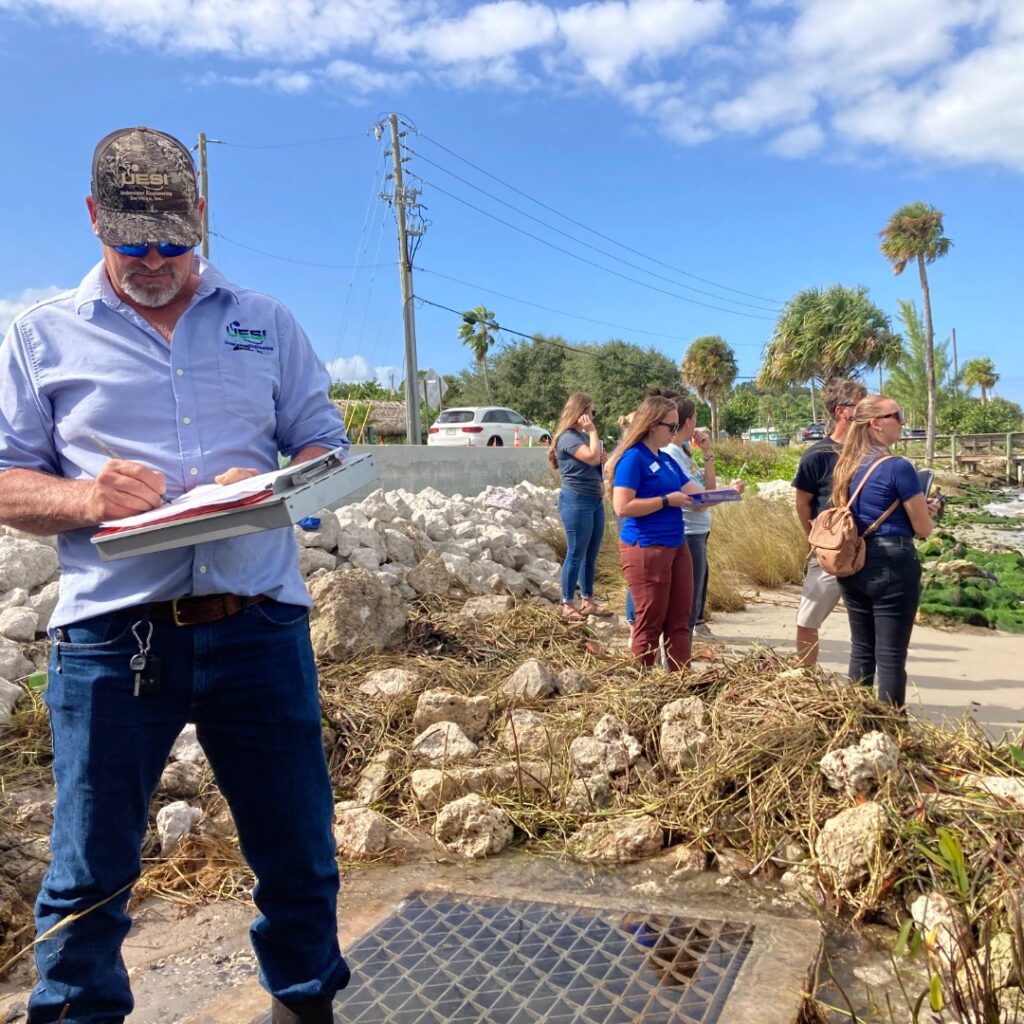
Participants of the 2023 Living Shorelines Training Course for Marine Contractors observe a living shoreline site at Jensen Beach. Image courtesy of Mandy Baily, Florida Sea Grant.
Living Shorelines Training Course
Living shorelines have garnered interest among landscape professionals, marine contractors, and homeowners, as these nature-based structures are recognized for reducing damage and erosion and offering essential ecosystem services. Despite the devastation from Hurricane Idalia – the most powerful storm to land in Florida’s Big Bend region since 1896 – Cedar Key’s living shorelines proved resilient against Idalia’s forces.
The inception of the Living Shorelines Training Course for Marine Contractors came to fruition in 2019; the increasing interest prompted the expansion of the program into the following years. For 2023-2024, the training course obtained support from the Florida Department of Environmental Protection to conduct in-person training in 12 locations throughout Florida, offering a greater number and distribution of the courses this year. Unlike the 2-day virtual training course in 2021, this year’s program included a more hands-on group approach, including field visits.
“Participants had the chance to observe living shorelines and see how they make a difference. We showed them a couple of projects, showed them potential sites, and had them develop a plan and design for a living shoreline. There are more activities in this year’s course, giving participants a chance to interact with presentation materials and see living shorelines instead of just hearing about them,” said Mandy Baily, Florida Sea Grant Living Shoreline Program Assistant and Course Facilitator.
A total of 165 students completed both days of the in-person course, fostering networking opportunities among professionals, homeowners, regulators, and instructors. The 2023 program sought to entice more contractors and landscape professionals to participate, but the high number of local government staff in attendance reveals another stakeholder interested in learning more about this nature-based solution. The inclusion of guest instructors from federal, state, and local agencies speaking on permitting provided opportunities for participants to ask questions they may have been intimidated to do otherwise. In response to increased interest, an additional workshop separately funded from the training courses offered a deeper exploration of permitting living shorelines. The training was conducted at seven locations in Florida on July 12, 2023, attracting over 180 registrants.
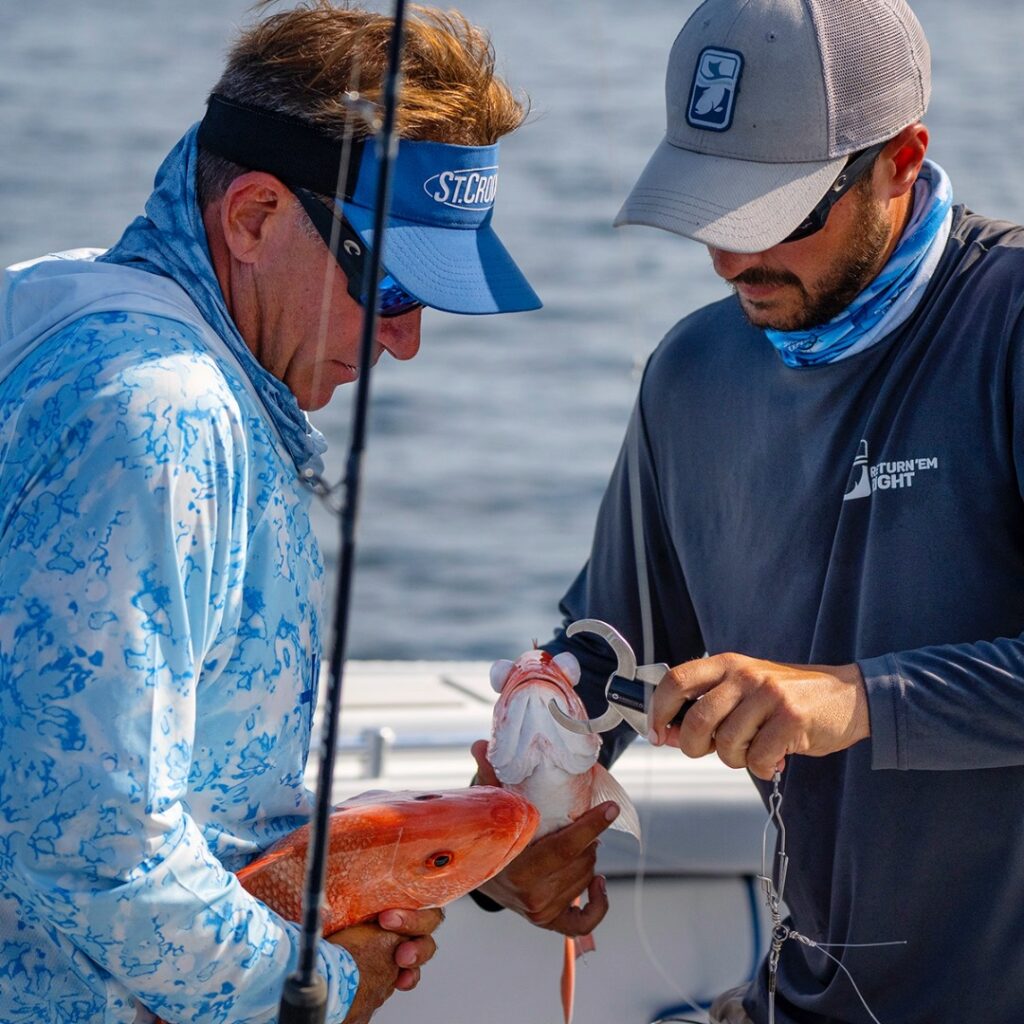
Return ‘Em Right team attaches a descending device and release tool to red snapper. Image courtesy of Nick Haddad, Florida Sea Grant.
Return ‘Em Right
Known for its unique continental basin and temperate waters, the Gulf of Mexico attracts a variety of reef fish species and anglers looking for the most prized catch. To enhance the survival of reef fish in the Gulf of Mexico, the Return ‘Em Right (RER) program was launched to educate anglers on best release practices for reef fish experiencing barotrauma.
In 2023, Return ‘Em Right launched an updated education module featuring new angler-driven content and technical tweaks to improve useability. More than 17,000 Gulf anglers, including 500 charter captains, completed the training, bringing the program’s total education module completions and gear distributions to over 28,000 anglers in two short years! Follow-up surveys revealed 97% satisfaction with the gear package and a shifting preference towards descending device use by private anglers.
Social media remained a priority and Return ‘Em Right reached over 285,000 people and amassed 500,000 impressions in 2023. The program engaged anglers from 47 U.S. states, Puerto Rico, and international locations such as Trinidad & Tobago, Australia, South Africa, and Seychelles. In 2023, the RER team presented to a diverse set of stakeholders at 15 outlets, including tournaments, trade shows, conferences, fishing clubs, and more. This outreach involved hosting a workshop in Australia and presenting in the Bahamas.
“The positive response from the fishing community has been one of the most inspiring aspects of this program. In 2024, we are excited to continue to build a sense of community around Return ‘Em Right and foster education through tournaments, tackle shop outreach, and other new initiatives,” said Nick Haddad, a representative of the RER team.
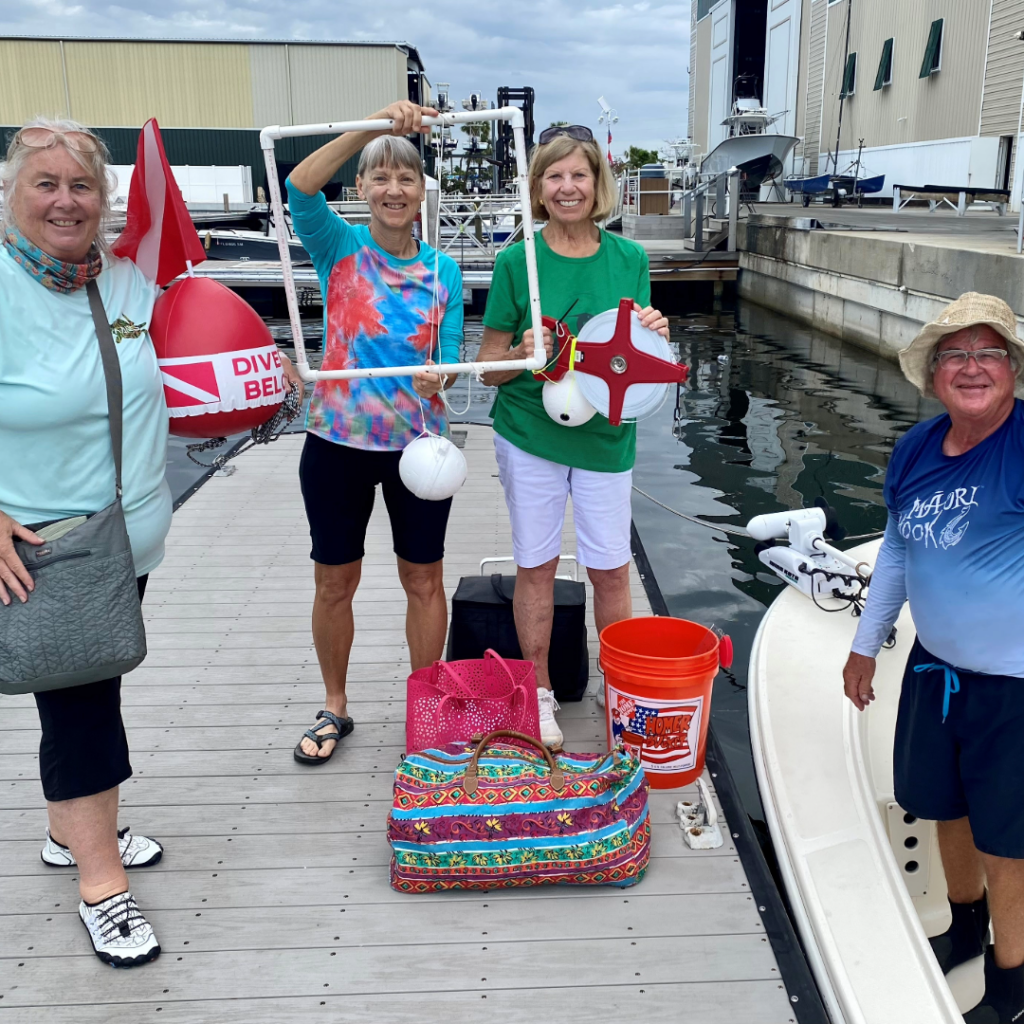
Eyes on Seagrass volunteers conducting surveys in Charlotte County. Image courtesy of Kate Rose, Florida Sea Grant.
Eyes on Seagrass
What do you call a volunteer passionate about surveying seagrass? A ‘sea’-grassroots advocate! This year, a growing number of Floridians dived into Eyes on Seagrass, a citizen science program empowering volunteers to monitor seagrass meadows in Charlotte, Sarasota, Escambia, and Santa Rosa Counties. The program conducts surveys on seagrass, macroalgae, and water quality, providing supplemental data for governmental and research agencies.
In 2023, the Charlotte County program recruited 102 volunteers (37% of which were returning) to conduct a total of 85 surveys. Before joining, 26% of citizen scientists considered themselves seagrass stewards, a number that soared to 82% after participation, indicating increased awareness and commitment. This year, the program enhanced training accessibility with improved training materials, including revamped field guides and online training videos.
Following Hurricane Ian’s impact in Southwest Florida, Eyes on Seagrass volunteers conducted post-storm surveys in April and July 2023. Their findings were showcased at the Benthic Ecology Meeting and the Coastal & Heartland National Estuary Partnership Watershed Summit. As a result of presenting the collected data, the Charlotte Harbor FWC Fisheries Independent Monitoring Lab expressed interest in collaboration, while the Southwest Florida Shellfish Association considered adopting the program’s methods for monitoring seagrass around clam restoration projects.
Venturing northward in the Gulf, the Eyes on Seagrass Panhandle program trained 21 volunteers, with 67% participating in survey collection in 2023. Training for the Panhandle program begins in March, and volunteers survey sites monthly between April 1 and September 30. Instead of collecting algae samples, volunteers gather water samples for analysis, covering a total surveyed area of 140 square meters this year. These efforts supported graduate work at the University of West Florida, where citizen volunteers logged 168 hours. The water samples collected were analyzed by graduate students, who also did site visits to monitor water quality.
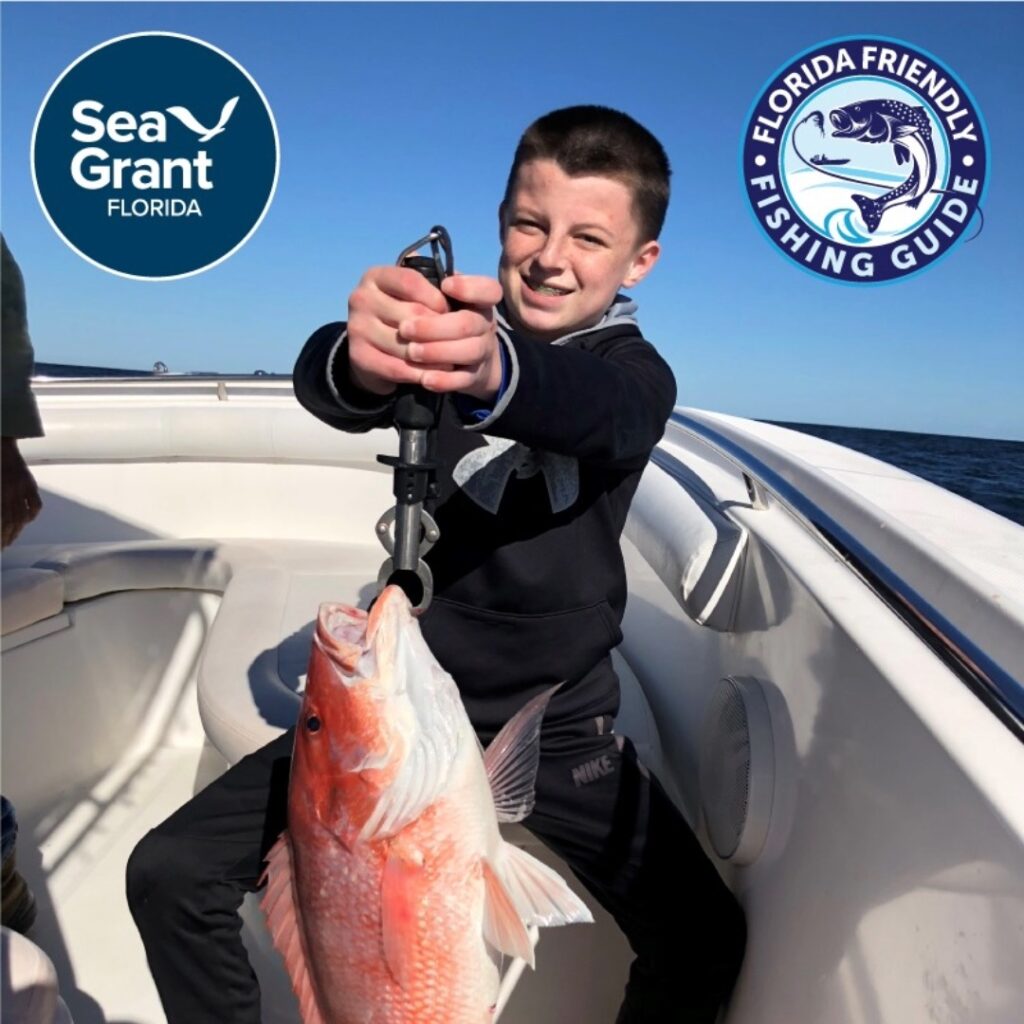
A young angler implements best fishing practices advised in the FFA online training course. Image courtesy of Mike Sippos, Florida Sea Grant.
Florida Friendly Angler (FFA) and Florida Friendly Fishing Guides (FFFG)
Florida is the fishing capital of the world, with over 2.4 million recreational licensed anglers contributing to a $13.8 billion economic impact, which supports thousands of jobs annually. Recognizing fishing’s profound influence on the state’s economy, environment, and culture, educating residents and visitors is crucial for the sustainable enjoyment of natural resources.
Florida Sea Grant created the Florida Friendly Fishing Guide Certification Program (FFFG) in 2019 for the Florida for-hire fishing industry. The FFFG course content educates guides on best practices when conducting an eco-minded fishing experience out on the water but also covers topics such as seafood handling and safety. To date, the program has over 119 certified guides and has sparked interest from charter operators, recreational anglers, and other Sea Grant programs. In 2023 Ohio Sea Grant launched their Erie PrOH Guide Certification Program, which was inspired by the FFFG and educates both for-hire captains and crew on conservation-oriented best practices in the Great Lakes!
In May of 2022, the Florida Friendly Angler Certification Program (FFA) was launched in response to recreational angler interest in the Florida Friendly Fishing Guide Certification Program. Catering to all recreational anglers and anyone engaging with Florida’s aquatic environments, the FFA is a free, narrated, self-paced online education program that covers best fishing practices, environmental ethics, and fisheries management. In 2023 the FFA program received awards from the Association of Natural Resource Professionals (ANREP) in educational technology as well as marketing. With over 2,300 registered users to date, a post-course survey revealed that 89% of participants retained the program’s teachings, 92% were inspired to adopt sustainable fishing practices, and an impressive 96% would recommend the Florida Friendly Angler Program. Looking ahead, a Spanish-translated version of the program, including fisheries science videos, is set to launch in 2024.
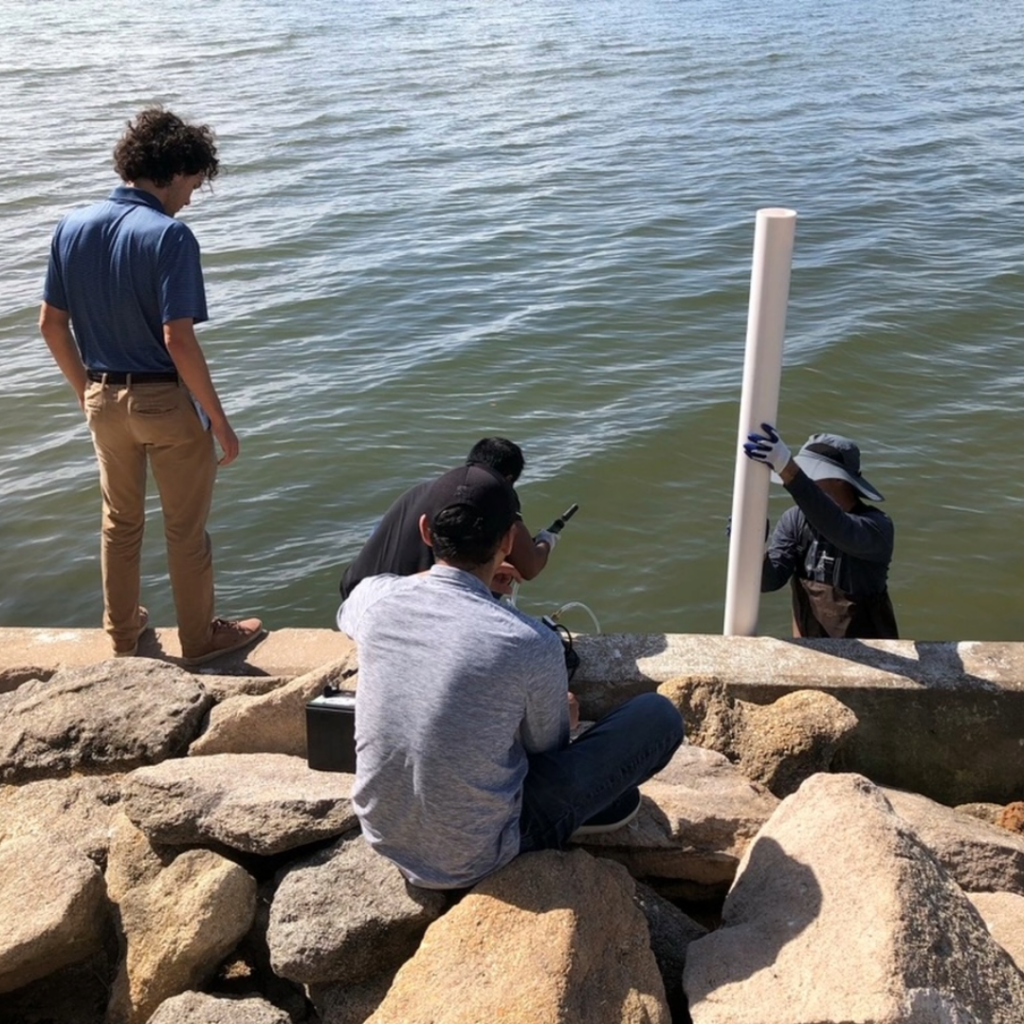
A team of experts from NOAA, South Atlantic Sea Grant programs, and local environmental engineers conduct surveys and assessments to devise a plan for green stormwater infrastructure. Image courtesy of Dr. Jason Evans, Stetson University.
Green Stormwater Infrastructure to Mitigate Flooding Issues in Cape Canaveral
Cape Canaveral’s beacon of innovation that embraces cutting-edge science and technology extends beyond space exploration! In recent years, the city has actively harnessed green infrastructure in the battle against climate change. From 2020 to 2023, a collaborative effort involving regional partners, including the NOAA Office for Coastal Management and the Sea Grant programs of Florida, Georgia, South Carolina, and North Carolina, aimed to develop flood-resilient transportation infrastructure in the Southeastern Atlantic coastal region.
Dr. Jason Evans at Stetson University integrated green and nature-based solutions to address flooding challenges along transportation corridors in Cape Canaveral. A desktop tool was developed to identify suitable public lands for green stormwater infrastructure projects. This information supported a public engagement process attended by 50 locals and the development of a conceptual plan that guided the acquisition of 15 acres for a regional stormwater park to address drainage concerns.
“The City of Cape Canaveral benefitted from the collaboration of regionally-based investigators with local consulting environmental engineers to design nature-based solutions to address chronic nuisance flooding. Regional teamwork strengthened the impact of local adaptation measures and results,” says Dr. Jason Evans, Project Principal Investigator at Stetson University.
The City of Cape Canaveral secured grants from Resilient Florida and the Florida Department of Environmental Protection, totaling $717,500 for constructing a pump tide gate to mitigate flooding. The project also received support from the National Science Foundation’s (NSF) Civic Innovation Challenge Stage 1 and Stage 2 for project expansion, including the construction and monitoring of a Green Stormwater Infrastructure (GSI). Subsequently, grant funds from the Arthur Vining Davis Foundations were used to install water level gauges and a water quality sensor, enhancing flood monitoring capabilities in the city.
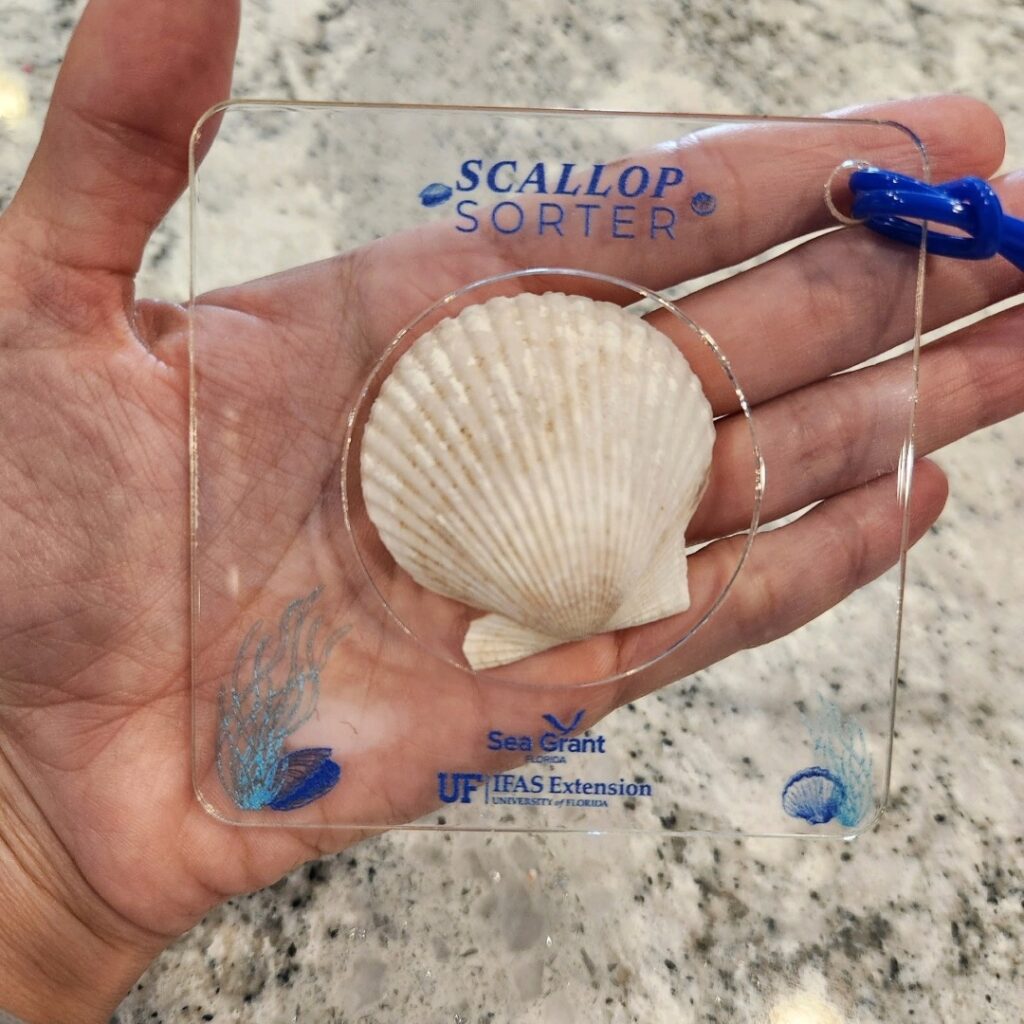
Scallop sorter. Image courtesy of UF/IFAS Florida Sea Grant.
Scallop Sorters
Bay scallops are indicator species that reflect environmental conditions including sediment loads, oxygen levels, salinity, and temperature. The presence of abundant scallops in an area is reflective of a healthy system! At the same time, scallops are susceptible to shifts in oceanic and climate conditions, cautioning for sustainable scallop harvesting practices.
In 2022, Florida Sea Grant introduced scallop sorters to preserve juvenile scallops for reproduction. After post-survey feedback, the public recommended increasing the size of the tool from the size of the sorting hole from 1.5 inches to 2 inches. The 2023 season saw high demand for scallop sorter tools, with 1,578 sorters distributed; nearly double the previous year! By the end of the season, sorters were distributed in 13 counties. Last year, they were only distributed in 3. Post-survey feedback with a 6.7% survey response rate indicated tools were used on 284 trips, returning almost 3,500 small scallops to the water.
FSG Communications integrated the scallop sorter rollout with a successful social media campaign in 2023. Weekly videos on Instagram and Facebook garnered 11,774 participants and 14,832 views.
“At the beginning of the season, the goal was to keep the distribution in Hernando and Taylor Counties. However, word spread like wildfire and folks were calling my office and emailing me from all over the place. We also had folks come to our office and fishing clubs directly reached out to us for the sorter tools, which didn’t happen the year before,” said Brittany Hall-Scharf, Florida Sea Grant’s UF/IFAS Extension Agent for Hernando County.
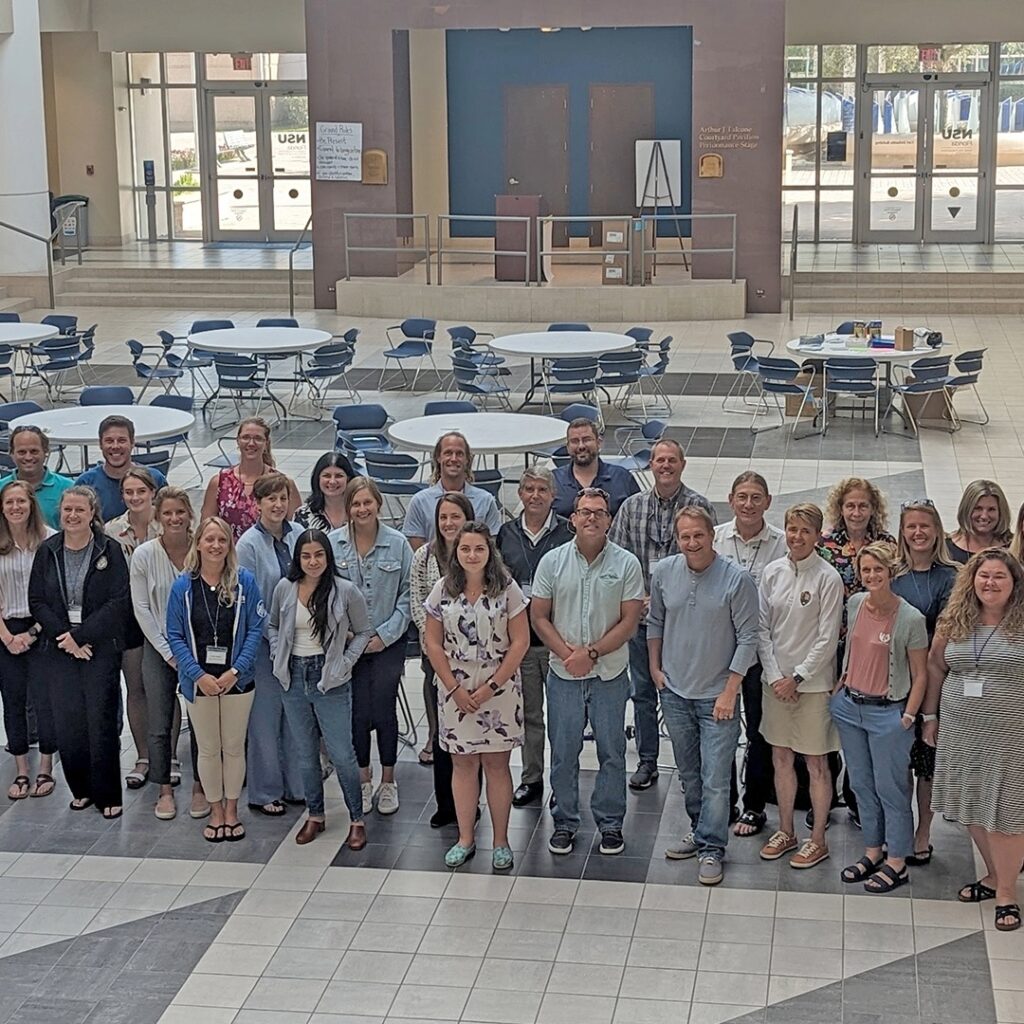
Attendees at Coral Disease Technical Workshop. Image courtesy of Maurizio Martinelli, Florida Sea Grant.
Corals Coordinators Organize Response to Coral Restoration
Florida Sea Grant, in collaboration with the National Oceanic Atmospheric Administration, UF Institute of Food and Agricultural Sciences, Florida Fish and Wildlife Conservation, and Florida Department of Environmental Protection, is actively addressing the challenges facing Florida’s coral reefs, including increased water temperatures, poor water quality, intense storms, and disease. The collaborative effort focuses on coordinating initiatives, establishing consensus on conservation goals, and rapidly disseminating information through networks and workshops.
This May, Florida Sea Grant hosted the annual Coral Disease Technical Workshop, hosting over 70 partners, including representatives from state and federal agencies, academic institutions, and non-governmental organizations. The workshop discussed leveraging successes in stony coral tissue loss disease response to benefit broader coral reef conservation needs. This initiative marks the evolution of the Florida Coral Reef Resilience Program, emphasizing a rapid response framework for acute disturbances.
Florida Sea Grant coral coordinators working with NOAA played a pivotal role in knowledge dissemination by creating fact sheets and an annual newsletter on Stony Coral Tissue Loss Disease. These resources share coral disease insights, updates, innovations, and accomplishments across U.S. coral jurisdictions. Additionally, their efforts to enhance collaboration are evident in helping organize the U.S. Regional Caribbean Stony Coral Tissue Loss Disease Workshop in Puerto Rico. The workshop facilitated information exchange, coordination, and collaboration among coral researchers and managers from the U.S. Virgin Islands, Puerto Rico, and Florida, aiming to improve responses, coordination, and collaboration in U.S. Caribbean coral disease efforts.
“By coming together, participants of the workshop demonstrated a shared vision and commitment to protecting coral reefs in the U.S. Caribbean region. The exchange of knowledge, fostering of collaborative projects, and formulation of innovative solutions hold promise for the future of these fragile ecosystems,” said Lexie Sturm, 2023 Sea Grant Knauss Fellow, placed in NOAA’s Coral Reef Conservation Program (CRCP).
A Hopeful Start to 2024
Certainly, 2023 brought its fair share of surprises! As we step into 2024 and search for attainable New Year’s resolutions, consider incorporating sustainable practices and get involved with local environmental activities. Florida offers a treasure trove of natural resources and biodiversity, so we must strive for its protection. Remember, the “world is your oyster” and there are countless opportunities to become stewards of the environment. Lucky for you, your steward adventure begins with some of the programs mentioned, and you can explore more on the Florida Sea Grant citizen science page to stay informed about future opportunities!